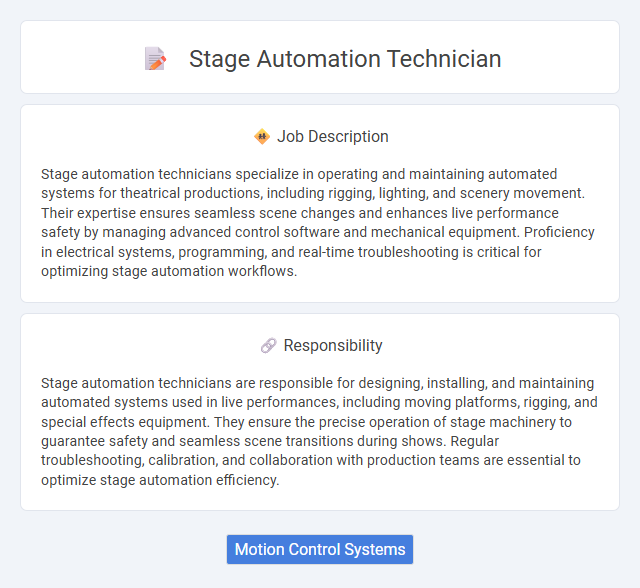
Stage automation technicians specialize in operating and maintaining automated systems for theatrical productions, including rigging, lighting, and scenery movement. Their expertise ensures seamless scene changes and enhances live performance safety by managing advanced control software and mechanical equipment. Proficiency in electrical systems, programming, and real-time troubleshooting is critical for optimizing stage automation workflows.
People who are detail-oriented and comfortable working with complex technical systems may be well-suited for a stage automation technician job. Those with strong problem-solving skills and the ability to work under pressure in fast-paced environments are likely to thrive in this role. Individuals who prefer consistent routines might find the unpredictable nature of live event automation challenging.
Qualification
Stage automation technicians require expertise in electronic control systems, mechanical equipment, and software programming essential for operating automated rigging and stage machinery. A solid foundation in electrical engineering or technical theater, along with certifications in automation technology or safety standards, enhances employability. Proficiency in troubleshooting, maintenance, and real-time problem-solving ensures efficient stage automation during live performances.
Responsibility
Stage automation technicians are responsible for designing, installing, and maintaining automated systems used in live performances, including moving platforms, rigging, and special effects equipment. They ensure the precise operation of stage machinery to guarantee safety and seamless scene transitions during shows. Regular troubleshooting, calibration, and collaboration with production teams are essential to optimize stage automation efficiency.
Benefit
A career as a stage automation technician may offer a high probability of steady employment due to growing demand in live entertainment and theater productions incorporating advanced technology. The role might provide benefits such as hands-on experience with cutting-edge automation systems, fostering specialized skills that enhance job security and career advancement. Opportunities for collaboration within creative teams could further increase job satisfaction and professional growth potential.
Challenge
Stage automation technician roles likely involve complex problem-solving under time pressure, requiring quick adjustments to mechanical and electronic systems during live performances. Challenges may include troubleshooting intricate automation setups and ensuring flawless execution to avoid disrupting the show. The dynamic environment probably demands high adaptability and precision to meet technical and artistic expectations simultaneously.
Career Advancement
Stage automation technicians specialize in designing, operating, and maintaining automated equipment in theaters and live events, developing skills in programming, robotics, and mechanical systems that enhance career prospects. Mastery of advanced control systems and proficiency with software like PLCs or DMX controllers open pathways to supervisory roles, technical direction, or specialized automation design positions. Continuous training and certifications in emerging technologies accelerate career growth in the expanding field of stage automation.
Key Terms
Motion Control Systems
Stage automation technicians specializing in motion control systems design, install, and maintain advanced mechanical and electronic equipment that enables precise movement of stage elements during performances. These professionals utilize programmable logic controllers (PLCs), servo motors, and sensors to ensure synchronized motion for props, lighting rigs, and set pieces, enhancing show dynamics and safety. Expertise in troubleshooting, system programming, and integration with digital control interfaces is essential for optimizing automated stage operations and minimizing downtime.
 kuljobs.com
kuljobs.com